Surachai Poultry Foods is preparing to build new broiler farms and scale up its processing capacity, according to Surachai Wongjindasak, founder and managing director.
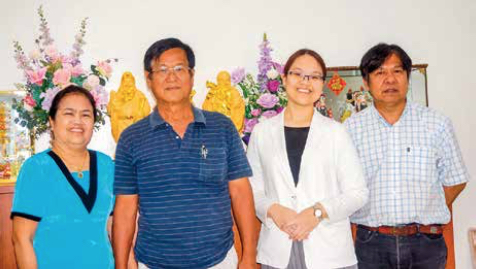
He said the company is expanding to prevent market share from being taken over by competitors. It will also expand cool storage in Q4, tap new markets and launch retail stores.
The business has seen disruptions from the emergence of modern trade in the Hua Hin area and nearby provinces, he said, adding that current business practices are outdated.
To stay competitive, Surachai Poultry Foods must do three things: improve economy of scale to reduce production costs, live up to the customer of today’s expectations of high quality meat, and satisfy customers with good service.
The company has made a strategic investment in a poultry processing plant worth 350 million baht in Hua Hin, 200 km southwest of Bangkok.
The slaughter plant offers a new opportunity to penetrate into Myanmar via the Singkhon Pass which is less than 120 km from Hua Hin.
Covid-19 crisis
Pattrasuda Wongjindasak, co-founder, said Covid-19 had a severe impact on the business in Q1 due to the lockdown policies that saw hotels and restaurants shut down from March to June. At the peak of the lockdown, sales dropped by at least 25% . Daily slaughtering capacity was reduced to 30,000 birds/day, vs 50,000 birds/day prior to Covid-19.
The crisis inflicted losses of more than 15 million baht during the lockdown, said Mr Surachai.
However, sales rebounded in the 2nd half. Production of 50,000 birds/day resumed following the reopening of schools, restaurants and hotels. The company plans to raise output to 60,000 birds/day at the end of 2020.
Nevertheless, Covid-19’s impact was minimal compared to the bird flu outbreak in 2004. At that time, the company faced a severe liquidity crunch after customers stopped buying chicken over fears of the potentially lethal virus.
It retained tonnes of frozen chicken meat without knowing when the crisis would be over. Finally, a liquidity crunch forced the company to sell the frozen meat for as little as 33 baht/kg. At that price, she noted, stocks were sold out quickly.
Nevertheless, it took several months to bring back consumer confidence and the market slowly picked up. “It was the hardest time we ever faced,” she said.
Broiler operations
Market volatility is uncontrollable. Therefore, company’s only option is to put a lid on expenses to sustain competitiveness.
Surachai Poultry Foods plans to raise broiler output through its own investments and collaborate with contract growers. Broilers from the company’s own farm will account for 80% of its entire broiler output in 2023, up from 60% at present.
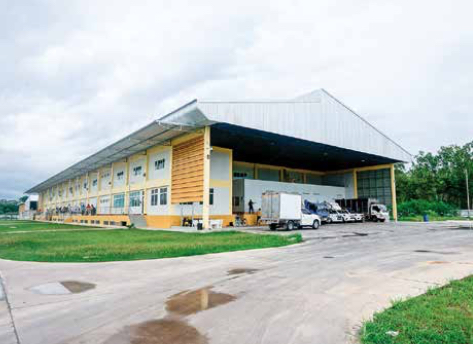
Buying live birds from third parties will be eventually replaced by the company’s own production and by contract growers as part of a strategy for improving quality.
The company buys broiler day-old chicks from two suppliers. The construction of a broiler breeder farm could also be in the works if chick quality and supply becomes troublesome.
Nopporn Yannam, general manager, said broiler farming and contract growing operations are overseen by Surachai Contract Farming Co Ltd. The subsidiary company plans to build new sheds every year. It is ready to build two new sheds capable of housing 40,000 birds each in 2021 at a cost per unit of around 10 million baht.
Also, it will entice more growers to join forces. Initially, the contract farms will be located within 70 km of the processing plant. It sees potential for more broiler chicken farms in western Thailand, for example, Rachaburi, Nakhon Pathom and Kanchanaburi.
Currently, birds bought from third parties often have quality issues such as breast blister, foot pad dermatitis, and especially mortality during transportation.
In comparison, contract growers are regarded as inseparable alliances for accelerating company growth. As a result, payment is quickly settled with growers, with a target of full payment within 10 days.
Surachai Contract Farming keeps 13 birds/sq m. It raises broilers to the end weight of 2.5 kg in 37 days, ADG 61 grams, survival rate 98% and FCR 1.53, and European Production Efficiency Factor 390. Cost per live bird is below 26 baht/kg.
It maintains a stocking density of 33 kg/ sq m in line with DLD recommendations. The cleaning, maintenance and fallowing period is 28 days, thus an entire production cycle takes 65 days, allowing for a total of 5.5 cycles/year, said Mr Nopporn.
Cold water at 2-5°C is sprayed at the cooling pads. There are four sensors installed in the shed. The temperature difference between the front and rear ends of the house is below 1°C. Misting nozzles at each end of the house spray cold water to maintain a uniform temperature throughout.
Water is chilled during off-peak hours after 10 pm until early in the morning. Pipes and tanks are well insulated. Maximizing bird growth potential shortens days-to-market and saves electricity. Full ventilation leads to faster growth which in turn reduces idle days that leave the poultry houses unused.
Mr Surachai added that the company is committed to reducing mortality during transportation to below 3% through improved bird catching and transportation. Treating birds humanely improves a company’s bottom line, he noted.
Slaughter operation
The plant is operated by 200 workers. Some 100 staff work in the low risk and bird handling area and the rest are employed in the high-risk area. The low risk and high risk areas are physically separated.
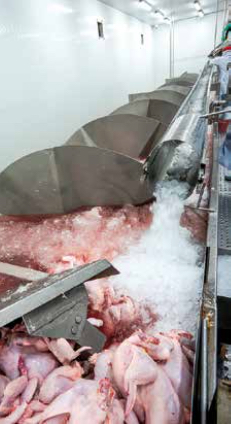
The birds are delivered from farms located within 250 km of the processing plant. They are rested for 30 minutes before workers hang them on the shackle line. The birds are electrically stunned in a water bath to immobilize them.
Stunning and killing methods are Halal compliant. The animals are alive and healthy at the time of slaughter. Muslim butchers cut the animal’s throat with a sharp knife severing the carotid artery, jugular vein and windpipe in a single swipe. During the process, the butchers recite a dedication to Allah.
Afterwards, the carcass is defeathered. Scalding temperature is set between 58°C to 62°C depending on the carcass weight. The carcasses are manually eviscerated, cleaned and chilled in screw chillers. Instead of chlorinated water, a lot of flaked ice and fresh, clean water is used, he said, noting that excessive fat and organic load in the water makes chlorine less effective for disinfection.
Screw chillers reduce core temperature from 40°C to below 6°C. blast freezer will be installed in 2021 in preparation for exports and Thailand Department of Livestock Development (DLD) export standards certification. Surachai Poultry Foods is already ISO 9001, Halal and GMP certified.
Processing weight is around 2.4 kg. It supplies made-to-order, cut up parts, and “NY cut,” which is a whole bird with offal, legs and heads removed. Operating cost is below five baht/bird. Overhead cost falls to four baht/bird or less if the plant operates at 60,000 birds/shift. The facility is designed to accommodate up to 90,000 birds/shift.
The meat is traceable via lot and sub-lot number. Production documents are stored for two years in line with DLD guidelines.
One critical control point is the inside and outside wash. It uses 2.5 litres of water/bird. Distance between workers in the cut up line is around 80 cm.
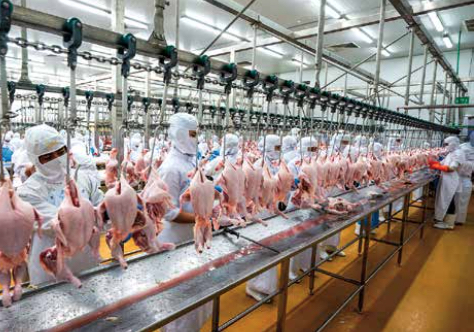
Energy is recycled. For example, coolant water from the water-cooled refrigeration compressors in the plant is used to pre-heat water for other uses such as scalders.
Byproducts including heads, intestines and feathers are sold to rendering plants. Condemnations are kept below 3% and foot lesions and breast blister issues have been eliminated. Discharged water from the plant, roughly 600 cubic metres/day, is treated and used for watering trees and cleaning the plant.
Distribution
The company distributes whole carcasses, dressed chickens and cut up parts via its “Jae Na” shop in Hua Hin market. Jae Na specializes in chicken products and its core value is to deliver good, affordable, and fresh chicken meat to food service, wholesale and retail customers. It plans to open 2-3 more outlets within 70 km of the processing plant, and a trucking depot in 2021.
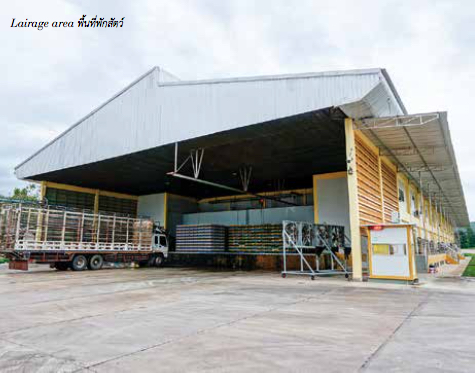
Cost per shop is 1-3 million baht depending on area and location. The shops are expected to earn around 100,000 baht/month. Sales via modern trade are also an option for reaching new customers.
Pattrasuda Wongjindasak, marketing director, said she is looking into developing Surachai Poultry Foods into a recognized brand with tip-top quality in the local market. She stressed that quality is the key to differentiating from other players. The company is also looking to diversify into food and other international businesses.
Founded 40 years ago as a local poultry farm and chicken butcher shop, Surachai Poultry Foods today is the largest poultry producer in Prachuab Khirikhan, southwestern Thailand.
